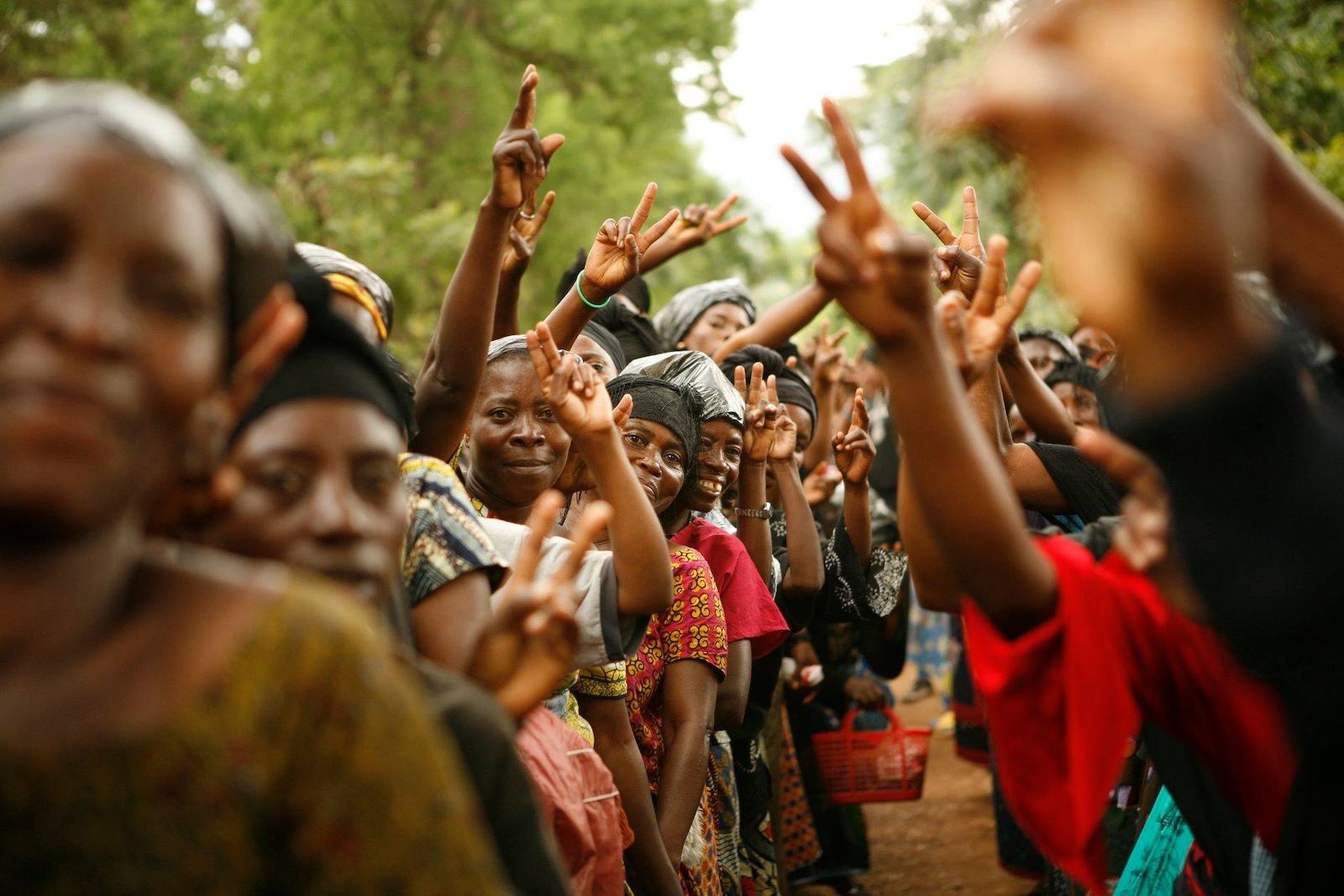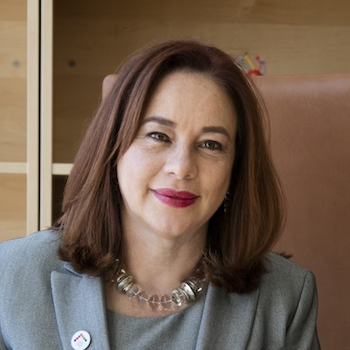
It’s Not Ok: What Data from Nigeria Reveals about Normalizing Violence Against Women
1 in 3 women globally (736 million) have been subjected to physical and/or sexual violence at least once in their lifetime since the age of 15. The pandemic has only made this worse.
Ending gender-based violence is integral to achieving gender equality – Goal 5 of the Sustainable Development Goals (SDGs) and a prerequisite for any fair, just, and democratic society
Globally coordinated campaigns like the #ItsNotOK and Global 16 Days – emphasize our collective responsibility to stop normalizing violence against women (VAW). But how are our collective efforts supporting women, especially those in countries affected by conflict, in actually speaking up for their rights?
What does the data tell us?
Women for Women International collects data annually to track women’s outcomes between enrolment and graduation in its Stronger Women, Stronger Nations program against various SDG aligned metrics. Among other things, women are asked over time about how they perceive their own ‘self-efficacy’ – their self-confidence and agency, their belief in themselves, ability to succeed and negotiate and make decisions about their own future. Women are also asked whether they have publicly spoken out against the abuse of women in their community.
Through each program year, even during the pandemic, Women for Women International observes a consistent and dramatic increase in women’s perceived self-efficacy. In 2020, women participants in post-conflict communities in Nigeria, the Democratic Republic of Congo (DRC), Afghanistan, Iraq, and Rwanda reported improved self-efficacy at the time of graduation of between 70 and 89%. Before joining our program, in some contexts, this was as low as 26%.
Comparing this to data on women speaking publicly against the abuse of women reveals a critical gap between knowing one’s rights and speaking up for them. Only 3-37% of women reported speaking publicly against the abuse of women at the time of graduation. Whilst this lower percentage range still reflected an increase from enrolment, the margins are significantly less than those for self-efficacy.
This is not surprising. We both know from our work – spanning from grassroots communities to the global level at the United Nations General Assembly – that achieving gender equality and ending violence against women requires more than placing the burden on women alone to speak up. It also requires us to address the harmful social norms and patriarchal legal and political systems that normalize violence. Efforts to combat discrimination and all forms of violence must be considered integral to the fight for gender equality, peace, and justice. And here the role of the United Nations is also critical.
We also have a powerful roadmap which resulted from the two-year Generation Equality Forum (GEF) which involved governments, civil society, indigenous organizations, grassroots feminist movements, the private sector. What makes the GEF unique is not only its inclusivity but its action-oriented outcomes. One of the six Action Coalitions is devoted to gender-based violence and envisions a set of transformative and scalable actions of prevention, services, and care to survivors and combatting impunity.
What does this look like in Nigeria?
In Nigeria, for example, Women for Women International’s program data in 2020 showed an increase from 27% to 89% in reported self-efficacy, but a change from 1% to just 19% in women speaking out against violence.
National statistics show that 24% of Nigerian men and 34% of Nigerian women believe it is acceptable to beat a wife in certain situations. For example, a woman program participant in Nigeria told us “If she is wrong, I will tell her to stop it because that might be what her husband doesn’t like and why he is always beating her. Then she should start doing what pleases him so he will stop beating her” and a male community member said: “It happens based on the wife’s character…if the mistake [in burning food] occurred once during cooking, she doesn’t deserve beating but if it occurs regularly during cooking then she can be beaten.”
Despite the national passage of the Violence Against Persons (Prohibition) Act in 2015, which prohibits violence against any persons in public or private life, the legislation has yet to be adopted as binding law by 18 out of 36 states. At the community level, women in Nigeria expressed to us that they often don’t see the practice of such laws beyond someone telling them that it exists – their day-to-day experience doesn’t show them that it exists.
In Women for Women International’s holistic program approach to gender equality, self-efficacy is increasing – but in the face of normalized violence, women fear the backlash of speaking up to tell their families and neighbors that behavior which they perceive as normal is now this ‘new’ and wrong thing called gender-based violence. This speaks to the power and scale of the issue and that it takes time and intentionality to change broader social norms governing the acceptability of messaging around violence against women. It also explains why publicly saying “it’s not okay” can be extremely hard to do, especially because the social cost of doing so and the risk of facing backlash is high.
That is why, in addition to Women for Women International’s holistic Stronger Women, Stronger Nations program, we are committed to creating a more enabling environment to end violence against women – engaging men as allies for women’s rights and supporting women to become agents of change. In Nigeria, to contribute to these efforts, we have established community platforms – bringing traditional and religious leaders, police officers, government officials, lawmakers, and healthcare workers to support women to advocate for an end to violence against women and support others to seek redress.
One such advocacy platform is a radio program dubbed ‘Voice of the Male Champions,’ which engages male listeners over the radio. Participants in our men’s Engagement Program, share their learnings and experiences from the program alongside experts, practitioners, and community leaders such as legal practitioners, doctors, religious and traditional leaders to discuss vital issues around tackling gender-based violence and women’s participation in social and economic activities.
“Some even thought there were no laws to protect women but with awareness, they now know there are laws protecting women.” – Man, Pankshin community, Nigeria
What next?
Clearly, the intersecting challenges and barriers to ending violence against women everywhere are both unique and universal. But this reality that the road to ending violence against women is complex and long should not spark despair. Though violence continues to be normalized and pervasive, women in Nigeria and elsewhere express their hope for sustainable change, building on the small gains they’ve already observed through women raising awareness and shifting attitudes within their own communities.
“Yes, there are changes that have taken place. Because now if a case of VAW is brought before the community leader they respond swiftly and seriously. And this has made the men also adjust because they don’t want their wives to report them to the community leaders.” – Woman leader, Riyom community, Nigeria
This reality, and hope, should inspire us to recommit, reinvest, and rethink our approaches. Ending violence against women will take time and sustained effort and resources – because behavioral changes in a society are a complex process. But it is also our best bet for transformation. Ending violence against women calls for a long-term, holistic approach that includes rights-based awareness-raising, survivor-centered services, and continued advocacy at all levels for changes in policy, law, and practices. Most importantly, as the work of Women for Women International shows, we must ensure women are supported to drive this change as leaders and as agents of change rather than ‘victims.’
We must collectively commit to creating an enabling environment by engaging community members as allies so that a woman’s self-efficacy can translate into her feeling able to safely speak out publicly against violence.

